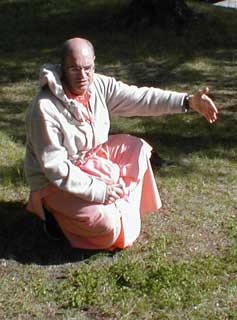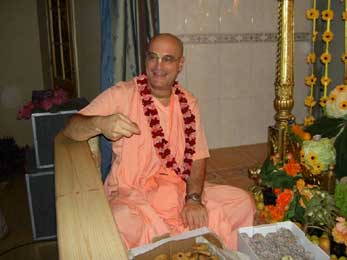The best structure that I have seen is the bhakti-vriksa structure. This structure means that you meet and sit in a circle and look at each other. This helps in developing mutual relationships.
The first thing that you do is something what we call “ice-breaking”. This means that everybody says something light, so that the atmosphere becomes relaxed. You can say, for example, what was the worst thing that happened to you last week. Everybody in the circle says something. There is a certain time for everything, and the ice-breaking takes about 10 minutes.

Then you can all bring out your japas and chant one round together. This develops the group spirit even more. This takes about 10 minutes. After that, you can all have a kirtan or bhajan for about 20 minutes.
After that the leader reads some text from some part of Prabhupada’s book, and then those present discuss it going in a circle. Everybody discusses what it said, what it mean and how to apply it in his/her life. This is called discovery. This is actually refreshing because everyone gets a chance to talk, not only some puffed up sannyasi who is sitting in front of all of you. It is announced in advance which part of the book will be discussed, and in this way everybody is forced to study, to prepre. In general, we all love to read some stories. Most of us will not read untill we are forced to read, because this is philosophy. However, philosophy becomes interesting when you talk it. This all takes about 45 minutes.
After that, you can talk about how have you been preaching to others during the week, how you have been distributing prasadam, how you have been talking with somebody whom you have met and given them Krishna consciousness, and how to invite somebody into the group. You can always think about inviting a guest to your group. This can take 20 minutes.
After that you honor prasadam.
If you keep this structure, it will actually keep the group together and encourage people to preach Krishna consciousness.
This is one part of bhakti-vriksa. The second part is that everyone in the group is appointed to take care of somebody else, to be responsible for them. I am responsible for you during the week. I call you on the phone and ask you whether you are chanting your rounds, whether you have some problems. In this way a personal relationship is established. In English we call that “each one teach one”. Another name is mentor. Everyone has a mentor. In this way you always feel responsible for somebody.
… all the other devotees are saying, “Oh, they are in maya”, but nobody calls them to ask them what is wrong…
Without such a structure things become a little impersonal. Many devotees are leaving the Society because nobody calls them on the phone, and all the other devotees are saying, “Oh, they are in maya”, but nobody calls them to ask them what is wrong. That means that it is very important for the devotees to take responsibility for taking care of other devotees.
5
We can call other people to the meeting as guests. But before someone joins the group, you have to be sure that they fit into the group, and that they commit themselves to come to every meeting.
When someone comes for the first time, should he sit in the group or by the side? By the side. They can observe and participate, if they want, but most people are too shy. It can be hard for them to comment on the texts from the sastra. They can chant with the group, but they should not feel pressure.
The principle is that a small group does not have more than 15 people. If there are more than 15 people, then the group has to break into two or three groups. And every group has to have a leader who is responsible for the whole program. If there are more then 15 people, then there are some in the back who never participate and they feel very discouraged because in every group there are people with big mouths who take over the whole group, and poor innocent people sit in the back. The leader has to take care, so that the people with big mouths do not dominate. This is called group facilitating. This is the most difficult thing for the leader to do.

…That means that it is very important for the devotees to take responsibility for taking care of other devotees…
This means, first of all, that we need to hear from others. There has to be an exchange of information and thoughts. Even if you are a leader, you have to be able to listen to others, to hear when they reveal their minds and to actually take this seriously.
Karmis sometimes say that God gave us two ears and one mouth. Therefore, we need to use our ears two times more than our mouths. For me it is a very important principle to hear from the devotees when I work with them. Our job as a leader is to make it easier for them to become Krishna consciouss. Instead of preaching, we have to share Krishna consciousness with those with whom we have contact. This means that you hear from people. You have to ask them questions, and hear where they are in their Krishna conscious life and what they actually need to hear.

Preaching means that you have to adjust your preaching according to time, place and circumstances. There are
different listeners for whom you need to adjust your preaching. Therefore, you need to see who you are speaking to; you need to be compassionate.
Comments are closed. Please check back later.




Comments are closed. Please check back later.